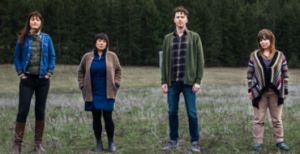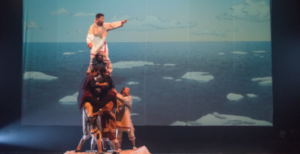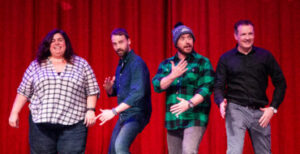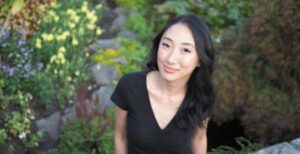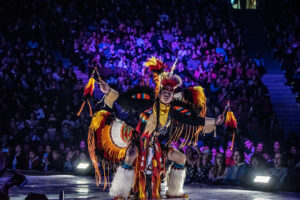After we have clapped, and TJ Dawe has bowed, and Donna with the Firehall has announced that talk-backs with Dawe and Gabor Maté will begin in about five minutes, the room settles into a hushed relaxation. Many wander in search of the bar, or perhaps the bathrooms, where I suppose some have to re-apply makeup and otherwise contend with the after-effects of a good cry. Around me, the audience members are mostly still in their seats, voices pitched low over their favourite moments of Dawe’s one-man performance.
It’s when talk-backs begin that I am truly impressed by the atmosphere of security and togetherness that I suddenly realize has been built over the last 80 minutes.
The intimacy of the talk-backs is immediate and tangible: one woman struggles to bring words to bear in describing her personal experiences with ayahuasca (a brew of various psychoactive infusions), while another person speaks of depression, and another of his alcoholism. There is a growing openness and sense of unconditional support in the audience, presumably mostly unacquainted with one another, that mirrors the comfort of the group therapy sessions Dawe describes in the play.
An hour and a half ago, when Dawe first stepped out on stage, he gathered himself, breathed out, opened his mouth to speak…and someone’s cellphone beeped. We laughed, of course, shielding a mild animosity towards the mystery antagonist, and subsequently the first words out of Dawe’s mouth were not the opening lines of the play, but a reminder to please turn them off, because sometimes they go off during the climax, and that’s a drag.
No-one’s phone went off during the climax, but there was enough crying to fill the silence.
Dawe’s autobiographical one-man show is touching because it’s real, and because it’s more or less local, but probably most because one can’t quite avoid the sense that this story is in some ways their own. Not in the particulars – Dawe’s story is of his experiences over a week-long group therapy ayahuasca retreat led by Dr. Gabor Maté – but in the distillation of a pattern of behaviour to a root experience, or in the acceptance of parts of oneself as damaging, there is probably some echo of truth to be found for most.
Dawe’s descriptions of solitude and social alienation seem to fit with the neurotic, conversational energy that he brings to the stage. When he describes himself falling naturally into exclusion, left standing silently away from a new group of people as they talk and laugh, we believe him – Woody Allen has spent forty years building up our expectations of nervous speech patterns, after all. But the irony of the show nags, always. Here is a man talking about awkwardness and alienation, with the bravery and charisma to do so on stage, for an hour and a half, and entertain.
This irony isn’t unpleasant to unravel, though; in fact, that’s some of the work that Dawe himself is doing. As the audience, we are given the sense that maybe we are the lucky beneficiaries of what in everyday life Dawe might hide from those around him. If there’s a quiet, shy type in your life whom you always suspected was thinking fascinating things all the time, Dawe’s one-man show supports that suspicion.
Insightful, informative, and very funny, Medicine achieves what all plays hope to: the feeling that you’ve met and interacted with someone new, and even that you’ve learned from them. The open sincerity and the simple human togetherness of Dawe’s work is well worth a trek through the depressing January rain.
